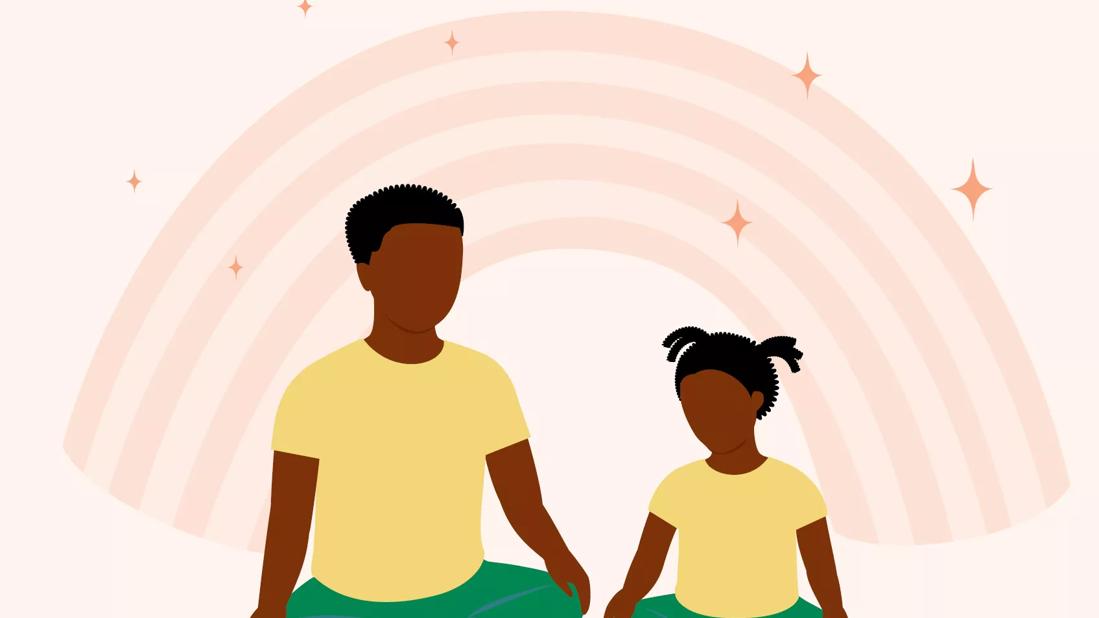Advertisement
7 tips to help your child focus on the present and build lifelong coping skills

Life can feel unnerving in a seemingly endless stream of stressful world events announced in worrisome headlines. That’s true if you’re an adult. It’s also true if you’re a kid.
Advertisement
Cleveland Clinic is a non-profit academic medical center. Advertising on our site helps support our mission. We do not endorse non-Cleveland Clinic products or services. Policy
No matter your age, there’s a benefit to using the practice of mindfulness to find calm within the chaos. And taking time to recenter and refocus is not an activity exclusive to adults.
It’s just a matter of learning how.
Disruptive events that tilt life off-balance offer an opportunity to discuss mindfulness with your child. Psychologist Ethan Benore, PhD, offers some recommendations on how to approach the topic with kids to help them build lifelong coping skills.
Mindfulness is about paying attention to the signals your body and brain send you. It calls for focusing on what you notice — thoughts, sensations, emotions, etc. — in the present moment, with an emphasis on curiosity or acceptance instead of judgment.
In many ways, your kids are probably already practicing mindfulness without realizing it.
“Being mindful is sometimes as simple as watching the clouds pass across the sky or snow fall to the ground,” notes Dr. Benore. “At its core, mindfulness is using your senses to be aware of what’s happening right now.”
At a more advanced level, mindfulness is about noticing things inside of your body as well as outside.
This skill helps children learn how to create a calming state within their nervous system. The stress-busting practice can benefit kids during challenging times filled with uncertainty. (If they’re worried about a test or safety at school, for instance. Or fretting about an activity.)
“Mindfulness is a healthy habit,” says Dr. Benore. “In many ways, it can be as important as exercise, sleep and healthy eating.”
Here’s how to help your child learn how to become mindful.
Advertisement
Embracing the concept of mindfulness can be difficult for kids. There’s so much activity and stimulation grabbing their attention in our go-go-go world that convincing them to tune it out for a bit might be tough.
“That’s an obstacle, but with patience and practice, mindfulness can become a welcome part of their day,” reassures Dr. Benore. “Acknowledging when your concentration shifts and re-focusing is also being mindful.”
It’s unfair to expect your child to practice mindfulness if you’re not invested as well. “If your child sees you do it, then that’s the message that will help your child engage in those healthy habits as well,” says Dr. Benore.
Share your experiences with mindfulness, too: “The more you talk about it, the better the chance that they will do it,” suggests Dr. Benore.
Younger kids naturally gravitate toward the concept of mindfulness. They’re actually really good at it.
“You could probably sit a child at the side of a stream and they could just exist there for quite some time — not caring about any future concerns but appreciating the present moment,” says Dr. Benore.
Establishing the habit early also can help your child build mindfulness skills that will come in handy when stressors and demands build in their teens.
It’ll be far easier for your child to be in the moment if a smartphone isn’t pinging every few seconds with social media alerts and messages. Disconnecting for even five to 10 minutes can help bring them a sense of peacefulness.
Mindfulness should be a personal exploration, not a mandatory task. “The more it’s a chore, the less they’re going to want to do it,” explains Dr. Benore.
Forced mindfulness also could lead to upsetting thoughts, which defeats the purpose.
Encourage your child to process their mindfulness experience and think about how they feel afterward. “Hopefully, they feel calm and in control and notice they are thinking clearer,” Dr. Benore says. “That will help them see the benefits of it.”
Periodically, ask your child questions after a mindful state and show interest: What did you notice? How do you feel now? Can you tell how you are thinking or acting differently now that you are more mindful?”
It’s important, too, to demystify the process of mindfulness. Start by explaining that you don’t need a room full of candles or chants, mantras or yoga poses. Creating a mindful moment can be as simple as:
“Separate the magical pieces from the truly experiential pieces of mindfulness,” says Dr. Benore. “Make the focus on being in the present, not on having extra things around you.”
Advertisement
Learn more about our editorial process.
Advertisement

Integrating coping skills into your teen’s daily routine helps turn self-care into a lifelong healthy habit

Tantrums and meltdowns are normal, but you can help your child manage their bigger emotions

Talking in the car, resisting the urge to judge and asking specific questions can help rebuild rapport

Yes, it’s safe for babies starting at about 9 months old and can help clear nasal mucus

While walking, be mindful of your body, your mind, your place in the world and all five of your senses as you pave a path forward, one step at a time

Local LGBT centers, online directories, visual cues and gender-affirming care or non-discrimination policies can all be helpful resources and cues

Wait until they’re at least 6 months old before your little one takes their first dunk

In a world where instant gratification is the norm, you can train yourself to be more comfortable waiting patiently

Focus on your body’s metabolic set point by eating healthy foods, making exercise a part of your routine and reducing stress

PFAS chemicals may make life easier — but they aren’t always so easy on the human body

While there’s little risk in trying this hair care treatment, there isn’t much science to back up the claims